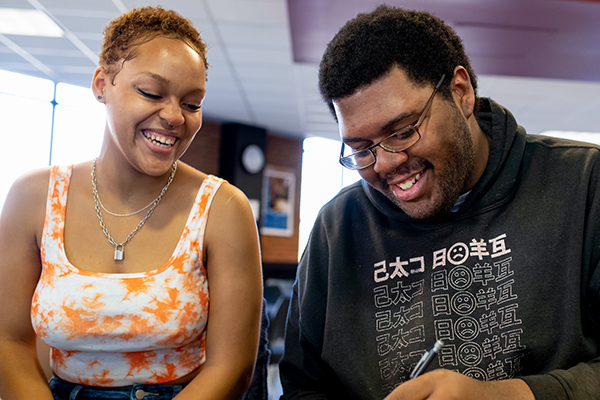Reasons to Enroll in College Even if Your Parents Didn’t
September 15, 2025
Posted by STLCC in Student Resources

You glare at the college application on the computer screen and slowly exhale. It’s a bit intimidating when you read the requirements and deadlines.
Let’s see. You’re not a transfer, graduate or returning student. You’re not signing up for a certificate, so you select freshman.
Next, you need to upload a link to your high school transcript, provide your ACT score, school codes, and it feels like a million other things you had no clue were part of the college application process.
Inwardly you scream, and reasons why you should give up flood your mind.
Challenges for First-Generation College Students
Expense: As the first person in your family who plans to attend college, the expense of college alone is enough to cause you to reconsider. You ask yourself, “How will I pay for tuition, travel, books, and support that “oh so important habit” of eating three meals a day?” With its low cost, 75% less than Missouri’s largest four-year universities, STLCC’s affordability can ease these concerns.
Distance: You’ve never lived apart from your family, and they are nervous about what the change might mean.
Your responsibilities: You’re like a second mom or dad to your younger siblings and wonder how your family will manage without your support. Attending a community college close to home is a good solution when expenses are tight and family ties are important.
Tradition: Because no one in the family has gone to college, they can’t give you advice about the process and question if it is really necessary for you to find a job. They might also question if you will get discouraged and quit if college is difficult.
With a guide and example, most things are probably easy enough to figure out. If you’re a first-generation college student and your parents didn’t attend college, that guide is missing, so the process of applying to college may seem especially intimidating.
Read on to learn why you should chart a new path with higher education that could create a blueprint for success for future generations.
Benefits of a College Education
Secure higher earning potential: Money doesn’t grow on trees, and having a college degree can help you earn more money and live comfortably. According to the U.S. Department of Labor, in 2025, people age 25 and up who worked full-time and didn’t finish high school made about $750 a week ($39,000 a year). High school graduates who didn’t go to college made around $960 a week ($49,920 a year). People with at least a bachelor’s degree earned about $1,732 a week ($90,064 a year). Those with advanced degrees like a master’s or doctorate made even more. The top 10% of men with these degrees earned at least $5,346 a week ($277,992 a year), and the top 10% of women earned at least $3,484 a week ($181,168 a year).
Increase job security and lower unemployment rates: “In Missouri, our employers need a skilled workforce to fill positions requiring credentials at all levels of training and education. In fact, 65% of jobs in Missouri will require education and training beyond a high school diploma by 2032, with 30% requiring a bachelor’s degree or higher. The Missouri Department of Higher Education and Workforce Development (MDHEWD) encourages students to consider all training and education opportunities beyond high school – whether that’s an apprenticeship or on-the-job training, earning a short-term certificate, or pursuing an associate degree, bachelor’s degree, or beyond,” said Bennett Boggs, PhD, commissioner of the MDHEWD.
He explained that people who go to college or get training after high school have lower unemployment rates. For example, in Missouri, about six out of every 100 people without a high school diploma don’t have a job. But for people with a bachelor’s degree or higher, only about one or two out of every 100 are unemployed.
First-Generation College Success Stories
Others have done it, and so can you. Sonia Sotomayor, associate justice of the United States is the first Latina Supreme Court Justice and a first-generation college student. She graduated from Princeton University and Yale Law School.
Tom Bradley served in public office for 30 years and was the first African American mayor of Los Angeles. He was a first-generation college student. He overcame many difficulties to secure an education at UCLA and Southwestern University Law School.
Elizabeth Warren is a U.S. Senator and a former presidential candidate. She graduated from the University of Houston as a first-generation college student. She also earned a law degree from Rutgers University.
Creating a Path to Future Success
Let these statistics and first-generation college graduates noted above inspire you to pursue a college education and career in whatever field interests you.





